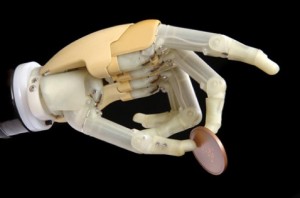Recently on the BBC World Service I followed a news article about a young man who decided to have his hand amputated in order to have a prosthetic version fitted. His hand had been damaged in a motorbike accident and was not fully functioning, but was however still attached to his arm.
His decision rather took me aback, here was a person choosing to improve the performance of a hand with a replacement. This is fundamentally different to fitting a prosthetic hand to a person that has either lost one or was born without one. The problem seems to be in the quality of prosthetic limbs.
Prosthetic limbs can be operated through the existing muscle system, for example they can be attached to existing muscles in the arm or by using electrical impulses. In this case the muscle use generates an electrical impulse that makes the hand move.
Scientists are currently testing a system that works directly from the brain. Implants register the brain’s impulses and send them directly to the hand. You think about the movement and the hand moves.
There is another advantage too, sensors in the fingers can send signals back to the brain so the user can actually feel the object they are touching.
All of this raises some questions, soon technology will provide us with a fully functioning prosthetic hand that the user controls directly with their brain. It will be hard wearing, reliable and you can touch hot things without burning yourself, it will in fact be better that a human hand.
People might then have elective amputation in order to get one. Who can make legal and ethical decisions about such an intervention? This argument also has implications for sport. South African athlete Oscar Pistorius has recently qualified for the Olympic Games in London and will be competing with 2 prosthetic legs.

Nicknamed 'the fastest man on no legs' this is Oscar Pistorius in Greenwich London before next years Olympics
Here we are moving into a discussion about the confines of the human body, but also about enhancement. Maybe he even has an advantage over human legged athletes.
Have a look at Transcendent Man for a futurist view of how robotics and medicine in general might change humanity in the future.
Further discussion of the ethical and responsibility issues raised by scientific advancement and innovation can be found on the Bassetti Foundation website, including all the links relating to the stories above. I collaborate with the foundation and publish through their site.
